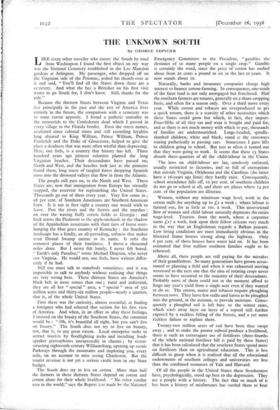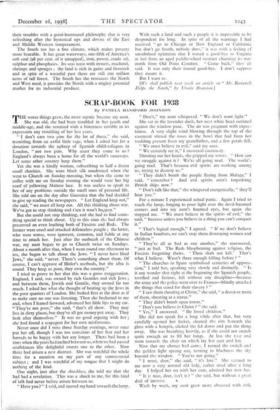THE UNKNOWN SOUTH
By GEORGE EDINGER
LIKE every other traveller who enters the South by road from Washington I found the first object on my way was the National Cemetery established in the Lee Mansion gardens at Arlington. My passenger, who dropped off on the Virginian side of the Potomac, jerked his thumb over at it and said, "You'll find all the States down there are a cemetery. And what the hec a Britisher on his first visit wants to go South for, I don't know. Still, thanks for the ride."
Because the thirteen States between Virginia and Texas live principally in the past and the rest of America lives entirely in the future, the comparison with a cemetery was to some extent apposite. I found a pathetic unreality in the memorials to the Confederate dead which I passed in every village to the Florida border. Even the street names, unaltered since colonial times and still recording loyalties long abjured to King William, Prince William, Prince Frederick and the Duke of Gloucester, helped to give the place a deadness that was more often wistful than depressing. Here, one feels, is a country that history has left. Three hundred years ago pioneer colonists planted the long Virginian beaches. Their descendants have passed on, North and West, and the beaches look just as the pioneers found them, long tracts of tangled forest dropping Spanish moss into the drowned valleys that flow in from the Atlantic. The people still pass on, to the North and West. These States are, now that immigration from Europe has virtually stopped, the reservoir for replenishing the United States.
Thousands go out of them every year. Very few come in ; 98 per cent. of Southern Americans are Southern American born. It is not at first sight a country one would wish to leave. Past the rivers and the forests and the marshes : on over the waving fluffy cotton fields to Georgia : and back across the Piedmont to the apple-orchards in the shadow of the Appalachian mountains with their tiers of forest over- hanging the blue grass country of Kentucky : the Southern landscape has a kindly, an all-pervading, softness that makes.
even Dismal Swamp untrue to its name. It robs the remotest places of their loneliness. I drove a thousand miles alone. But I never felt lonely, I never felt bored. "Earth's only Paradise," wrote Michael Drayton, who never saw Virginia. He would not, one feels, have written differ- ently if he had.
Still one must talk to somebody sometimes, and it was impossible to talk to anybody without realising that things are very wrong here. These thirteen States are America's black belt in more senses than one ; rural and industrial, they are all her " special " area, a " special " area of 552 million acres and thirty-six million people—nearly a quarter, that is, of the whole United States.
First there was the curiosity, almost resentful, at finding a foreigner who had selected that section for his first view of America. And when, in an effort to allay these feelings, I insisted on the beauty of the Southern States, the comment would be : "Oh, it's beautiful all right, but you can't live on beauty." The South does not try to live on beauty, not, that is, to any great extent. Local enterprise seeks to attract tourists by floodlighting rocks and installing loud- speaker gramophones unexpectedly in chasms ; by recon- structing eighteenth-century Williamsburg, opening up scenic Parkways through the mountains and imploring you, every mile, on no account to miss seeing Charleston. But the tourist revenue is not yet a serious credit item in any State budget.
The South does try to live on cotton. More than half the farmers in these thirteen States depend on cotton and cotton alone for their whole livelihood. "No other similar area in the world," says the Report just made by the National Emergency Committee to the President, "gambles the destinies of so many people on a single crop." Gamble is certainly the word, since the price of cotton has rushed about from 20 cents a pound to six in the last to years. It now stands about to.
Naturally, banks and insurance companies charge high interest to finance cotton-farming. In consequence, one-tenth of the farm land is not only mortgaged but foreclosed. Half the southern farmers are tenants, generally on a share-cropping basis, and often for a season only. Over a third move every year. While cotton and tobacco are overproduced to get a quick return, there is a scarcity of other necessities which these States could grow but which, in fact, they import. Four-fifths of all they eat and wear is bought and paid for, and as there is not much money with which to pay, thousands of families are undernourished. Large-headed, spindle- shanked children, white and black, stand at the crossways staring pathetically at passing cars. Sometimes I gave lifts to children going to school. But just as often it turned out that they were going to work. It seems that these 13 States absorb three-quarters of all the child-labour in the Union.
The laws on child-labour are lax, carelessly enforced, usually restricted to factories, and so full of exemptions that outside Virginia, Oklahoma and the Carolinas (the latter have a 16-years age limit) they hardly exist. Consequently, school attendance falls off, to per cent, of southern children do not go to school at all, and there are plates where 14 per cent. of the population are illiterate.
Women, without any minimum wage level, work in the cotton mills for anything up to £2 a week ; where labour is, farmed out, for as little as los. a week. This 'unrestricted flow of women and child labour naturally depresses the entire wage-level. Tourists from the north, where a carpenter earns £17 a week, look upon their fellow citizens very much in the way that an Englishman regards a Balkan peasant.. Low living conditions are most immediately obvious in the blistered frame houses strung along the highway. Only 6 per cent. of these houses have water laid on. It has been estimated that four million southern families ought to be rehoused.
Above all, these people are still paying for the mistakes of their grandfathers. So many generations have grown accus- tomed to planting a field and when it was exhausted moving westward to the next one that the idea of rotating crops never seems to have occurred to the majority of their' descendants. Probably most of them could not at the moment afford to forgo any year's yield from a single acre even if they wanted to do so. The cotton, maize and tobacco require ploughing between rows. They leave few stalks and leaves to be ploughed into the ground, in the autumn, to provide moisture. Conse- quently a ploughed soil is left bare to the winter rains, which wash away layer on layer of a topsoil still further exposed by a reckless felling of the forests, and a yet more reckless failure to replant them.
Twenty-two million acres of soil have been thus swept away ; and to make the poorer subsoil produce a livelihood, there is such an extravagant use of fertilisers (three-fourths of the whole national fertiliser bill is paid by these States) that it has been calculated that the southern States spend more• on fertilisers than on agricultural education. This is less difficult to grasp when it is realised that all the educational endowments of southern colleges and universities are less than the combined resources of Yale and Harvard.
Of all the people in the United States these Southerners have, psychologically, stood up best to the depression. They are a people with a history. The fact that so much of it has been a history of misfortunes has steeled them to bear their troubles with a good-humoured philosophy that is very refreshing after the hysterical ups and downs of the East and Middle Western temperament.
The South too has a fine climate, which makes poverty more bearable. It has great waterways, one-fifth of America's soft coal (98 per cent. of it untapped), iron, power, crude oil, sulphur and phosphates. Its seas teem with oysters, mackerel, shrimps and sponges ; the land is rich in game and livestock and in spite of a wasteful past there are still 200 million acres of tall forest. The South has the resources the North and West need, it provides the North with a mighty potential market for its industrial produce. With such a land and such a people it is impossible to be despondent for long. In spite of all the warnings I had received "go to Chicago or New England or California but don't go South, nobody does," it was with a feeling cf unsubdued optimism that I waved a good-bye to Virginia at last from an aged paddle-wheel steamer churning its way north from Old Point Comfort. " Come back," they all said. It was only their formal good-bye. I don't suppose they meant it.
But I want to.
We shall publish next week an article on " Mr. Roosevelt Helps the South," by Ursula Branston.]















































 Previous page
Previous page